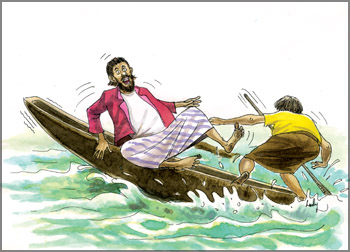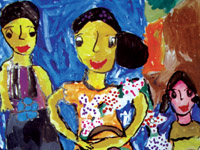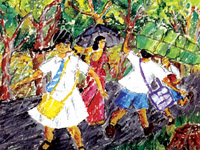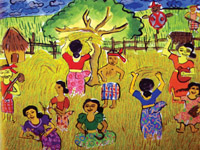|
Children
Folk tales of Sri Lanka:
Half - wit and a pundit
Retold by R.S. Karunaratne
Sethan never attended school and helped his father to operate his
ferry. His father earned a good income daily by taking people and
sometimes carts across the river. Sethan loved to work on the ferry
because he met all types of people crossing the river.
One day Sethan’s father fell ill. He asked his son to work on the
ferry as he had gathered enough experience. Sethan was glad that he could ferry schoolchildren who
always had a good word for him.
experience. Sethan was glad that he could ferry schoolchildren who
always had a good word for him.
Sethan started working on the ferry from early morning.
He helped many schoolchildren, ordinary villagers and some monks to
cross the river. After some time, he was able to relax as there were no
more people to use the ferry. While Sethan was dozing off under the
shade of a tree, Pandithuma (a pundit) came to him and told him that he
wanted to cross the river. Sethan got up and started pulling the ferry
carrying Pandithuma.
When they reached the middle of the river Pandithuma wanted to test
Sethan’s knowledge.
“Have you ever been to school?
“No, Sir”,
“What else do you know apart from operating this ferry ?”
“Nothing, Sir,”
“If you don’t know anything else, you are a half-wit.”
“May be, Sir”.
“You see, Sethan, I know many things. That’s why the villagers call
me “Pandithuma”.
“I’m glad to hear that, Sir”.
Meanwhile, the ferry started going down the water for no fault of
Sethan. ‘Pandithuma, the ferry is sinking. You have to jump into the
river and swim for safety”.
“Oh, my God, I can’t swim. Sethan, please save me.”
Sethan was a good swimmer like his father. He had no difficulty in
taking Pandithuma to the river bank where a few other villagers were
waiting to cross the river.
“Thank you Sethan for saving my life. I think I have to change my
opinion about you.”
“You are not a half-wit. You know many things even pundits don’t
know.” Sethan bowed his head and Pandithuma slowly disappeared from the
scene.
Firsts at Art Council art competition
Some drawings which won first places at the Children’s Art
Competition and festival organised by National Art and Sculpture Sub
Council of the National Art Council, Department of Cultural Affairs,
Cultural Ministry.
Post Primary Section
Senior Section
Primary Section
|

G. R. I. N. Seshala Bandara
32, Siyambalapitiya Road,
Kegalle. |

D. M. L. Rasadi Gunatillake
134 A, Pragathi Mawatha,
Pannipitiya.
|

M. M. Minthaka Bandara Seneviratne
Telecom Quarters
Peradeniya. |
Secondary Section
Senior Secondary Section
|

Nipuni Diyendra Tantrimudali
No. 68, Church Road,
Kandana. |

R. P. G. J. Alutwatte
Isurupaya, Debahera,
Nittambuwa. |
The rush for colonies
Thoughts and actions that transformed
the world
European countries had been building colonial empires for many years.
England, for example, first entered India in the mid-1,600s. After 1850,
however, the European industrial powers rushed to extend their colonial
empires. One country’s control of the government and economy of another
country or region is known as imperialism. The period from 1850 to 1914
is often called the “Age of Imperialism”.
Reasons for
imperialism
There were several reasons why European countries were interested in
acquiring overseas colonies in the second half of the 1800s. Many
countries were becoming more industrialised, and they needed raw
materials such as rubber, oil, and minerals for their factories.
Their factories produced quantities of goods that soon filled markets
at home. New markets for these
|

Queen Victoria of England |
products had to be found. In addition, there was increasing
European demand for African and Asian crops such as sugar, bananas,
rice, and coffee. European countries wished to control the supply of
these products and to make money at the same time.
Another reason for imperialism among European countries was
nationalism. Nationalism is a form of national pride.
However, nationalism in some countries led to a feeling that the
country was superior to other countries.
These countries began to build colonial empires because they believed
that ruling lands overseas showed their superiority.
It also seemed to many Europeans that Asian and African cultures were
inferior because they did not have rail-roads and factories.
Improved technology, particularly weapons, helped these European
countries to take over large areas of Africa and Asia.
European expansion
Asia, with its millions of people and its valuable raw materials, was
a target for European powers that wanted to expand. By 1900, almost
every Asian country was controlled by foreign powers.
The Jewel in the Crown
|
 
The French established their rule in Vietnam (right), and the
British ruled India. |
The British called India, their most valuable colony, the “jewel in
the crown.” India supplied Britain with tea, coffee, cotton and other
agricultural products. India’s 300 million people were sold British
manufactured goods, especially cheap textiles. In fact, Britain
prohibited Indians from producing their own textiles so that they would
not compete with British exports.
British rulers did bring some benefits to India. Travel and
communication were improved when the British built railroads and roads
and installed telegraph and telephone lines. Britain also established
schools and colleges for Indians.
The Dutch and the
French in Asia
The Dutch controlled a chain of southeast Asian islands they called
the Dutch East Indies. These islands are now the country of Indonesia.
The Dutch owned large plantations that grew products for export. The
islands were one of the richest colonies, but the Indonesians did not
share in this wealth.
France had colonies in Indochina, a peninsula in Southeast Asia that
includes present-day Vietnam, Laos, and Cambodia.
Like the Dutch, the French formed plantations that grew crops for
export. The French also built roads, railroads, telegraph and telephone
system, schools, and hospitals. Young men were educated in France to be
doctors, engineers, and architects in their native lands.
Imperialism and China
Throughout the 1800s, China had grown weaker. Europeans took
advantage of this weakness by seizing regions of China. Each region was
called a sphere of influence, and area where a European country had
economic privileges including the exclusive right to control factories,
mines, and railways.
Europeans did not control the Chinese government in Beijing, but they
ruled in their spheres of influence. They forbade Chinese people to
enter European parts of Chinese cities without permission. Europeans
accused of crimes were tried in European courts rather than in Chinese
courts. Furthermore, European business people forced the Chinese
government to give them favourable treatment.
To be continued |

